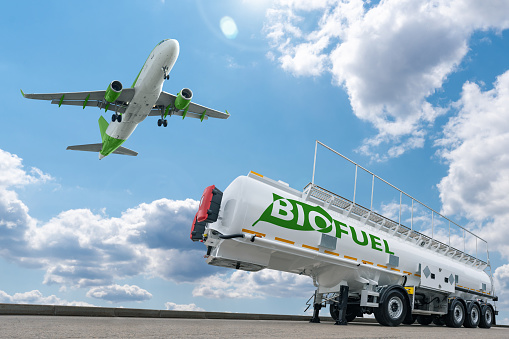The path to finding a clean alternative to high carbon aviation fuel will not be a straightforward one, a new report has warned. The Environment Journal reports that scientists from the Royal Society have concluded that the widespread introduction of green aviation fuels is not a realistic prospect in the near future.
The UK government has launched a Jet Zero strategy to develop a framework for achieving net zero aviation by the year 2050. However, reaching this target will involve developing viable Sustainable Aviation Fuels (SAFs) that can be produced affordably and in enough volume to supply demand.
Although biofuels are already in use by several airlines, the Royal Society report states that these currently still produce some CO2. The scientists have also said that to produce enough biofuel to replace fossil based aviation fuels, up to half of the UK’s arable land would be taken up to grow biomass crops.
According to the report, there is no one obvious path to clean aviation fuel. It identifies four potential sources of SAF: biofuel, hydrogen, synthetic efuels and ammonia. However, all of these options have disadvantages and the UK is not in a position to move forward rapidly with any of them.
Battery power as a viable alternative to power aircraft was ruled out by the report’s authors, because they consider them unlikely to be powerful enough to sustain commercial passenger flights, at least by the year 2050.
Professor Graham Hutchings, chair of the report’s working group, said: “The requirements for an alternative to jet fuel, to kerosene, is energy density, has to be sufficient to sustain short and long haul flights, it must be produced globally at scale, it must be cost-competitive and it must be implementable by 2050.”
A Department for Transport spokesperson said its SAF programme was comprehensive and competitive, commenting: “Our Jet Zero Strategy sets out how we can achieve net zero emissions from UK aviation by 2050, without directly limiting demand for aviation.”
They added: “Sustainable Aviation Fuels and hydrogen are key elements of this, and we will ensure that there is no impact on food crops.”
Currently the UK imports a high volume of raw material for biofuel from China, Sky News reports. One of the main sources is used cooking oil, with 423 million litres imported during 2021. Other sustainable biofuel sources include rapeseed, miscanthus, and fast-growing poplar trees.
A spokesperson for Airlines UK, the industry’s trade body, said “there is no magic bullet”, adding: “But by modernising airspace to make flying more efficient, by introducing new zero-emission technology like hydrogen aircraft and by upscaling the use of sustainable aviation fuels this decade, it can be achieved.”
In 2019, domestic and international flights accounted for around 8% of UK Co2 emissions. This figure dipped when international travel was severely restricted during the pandemic, but the government believes that passenger numbers could soar by as much as 70% by the year 2050.
If you are looking for steep angle conveyor accessories, please get in touch with us today.





